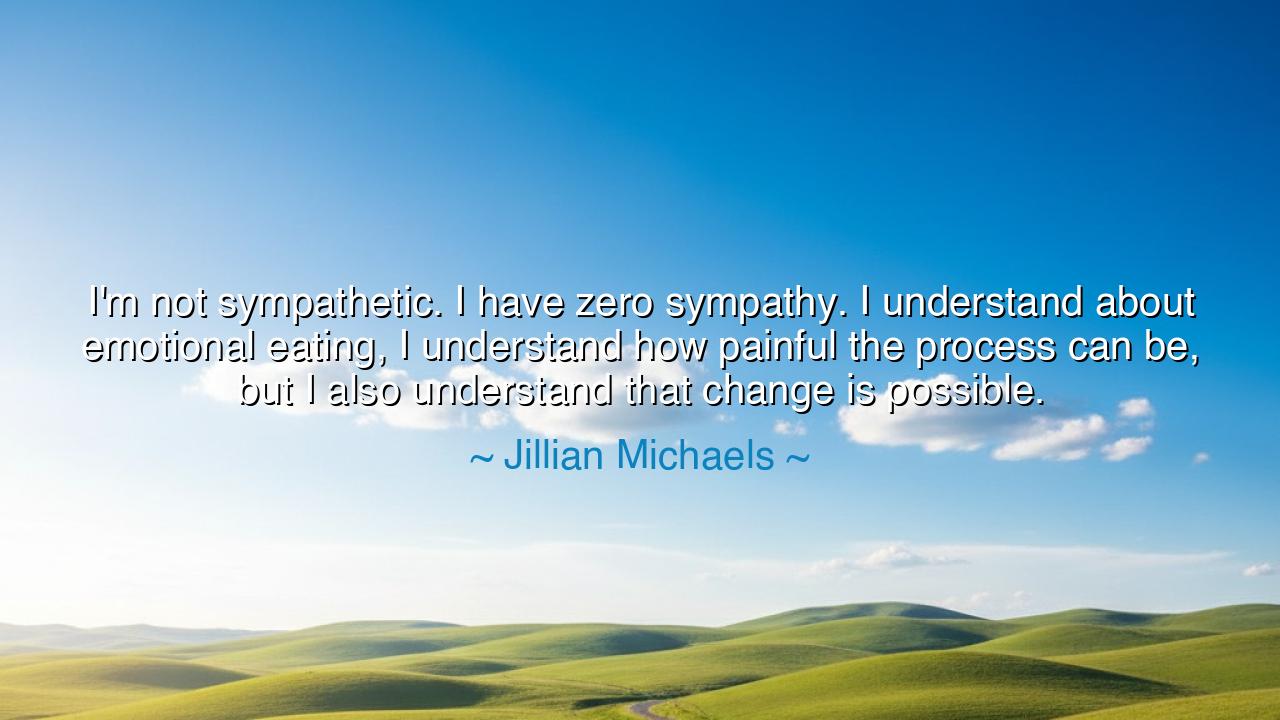
I'm not sympathetic. I have zero sympathy. I understand about
I'm not sympathetic. I have zero sympathy. I understand about emotional eating, I understand how painful the process can be, but I also understand that change is possible.






In the depths of the human spirit, there lies a struggle that has plagued us for centuries—the desire for change. Jillian Michaels, in her words, “I’m not sympathetic. I have zero sympathy. I understand about emotional eating, I understand how painful the process can be, but I also understand that change is possible,” speaks to a timeless truth that all individuals must come to terms with: change requires not only awareness of our weaknesses but also the will to overcome them. Michaels’ words do not seek to diminish the real pain and struggle of emotional eating but to challenge us to recognize that while sympathy may comfort, it is action and personal responsibility that ultimately lead to true transformation.
The struggle for change is ancient. In the early days of civilization, heroes like Heracles of Greek mythology were seen as embodiments of strength and resilience, not because they were free from hardship, but because they faced seemingly insurmountable challenges and overcame them through determination. Heracles’ twelve labors were a test of not just physical strength but of mental fortitude, and it was through his unwavering commitment to overcoming his trials that he earned his place among the gods. In much the same way, the journey toward personal transformation—whether it be overcoming addiction, emotional eating, or any other struggle—requires not just awareness of the issue but a willingness to confront it and take the necessary steps to change. Michaels, much like the ancient heroes, reminds us that it is action—not sympathy—that leads to true change.
In ancient Rome, Seneca, the Stoic philosopher, taught that true freedom comes not from external forces, but from the mastery of self. He wrote extensively on the importance of self-control and the power of willpower in overcoming adversity. He believed that sympathy, while well-intentioned, could not offer the true relief one sought—only personal discipline and the strength to act could lead to lasting change. Seneca’s philosophy aligns with Michaels’ perspective: it is not about comfort or avoiding pain; it is about acknowledging the pain and then doing the difficult work of transformation. Sympathy for one’s struggles can offer temporary solace, but it is the willingness to confront and change one’s habits that leads to lasting peace.
Consider the story of Thomas Edison, whose path to success was not marked by comfort or ease, but by repeated failure and the relentless pursuit of improvement. Edison faced rejection from both peers and the public, but it was his unyielding belief that change was possible that propelled him toward his ultimate success in inventing the light bulb. Edison’s journey was not one of sympathy but of personal responsibility—he did not wait for others to make the world better for him; he took matters into his own hands and worked tirelessly toward his goal. In the same way, Michaels calls upon us to take responsibility for our own actions, to push beyond the comfort of sympathy and to step into the power of personal transformation.
The lesson in Michaels’ words is one of empowerment. While it is easy to remain stuck in patterns of self-doubt and negative habits, we must understand that true change comes from within. Sympathy can act as a crutch, offering temporary relief from the struggle, but it is through personal effort and the commitment to break free from our unhealthy patterns that we find true freedom. Just as the ancient philosophers taught that the mind must be disciplined to attain peace, we must discipline our actions and habits to achieve well-being. Change is not merely a hope or a wish; it is the result of consistent, deliberate actions that, over time, reshape who we are.
In our own lives, we must recognize that the struggles we face—whether they be with emotional eating, addiction, or any other challenge—are not insurmountable. Michaels reminds us that while the path may be difficult, the power to change lies within our grasp. But that power requires action, not indulgence in self-pity or the comfort of sympathy. Progress is made when we take ownership of our journey and recognize that while others can offer us support, it is ultimately we who must do the work to transform our lives. Self-discipline, commitment, and the refusal to succumb to defeat are the keys to lasting change.
Let us, therefore, take action in our own lives. Let us face our struggles not with the hope for sympathy, but with the strength to change. Like the heroes of the past, we must commit ourselves to overcoming the obstacles that lie in our path, knowing that true transformation requires effort, resilience, and the courage to confront our most difficult challenges. By doing so, we do not merely survive; we thrive, and in doing so, we inspire others to do the same. Change is within our reach—but it is ours to create through action, not sympathy.






AAdministratorAdministrator
Welcome, honored guests. Please leave a comment, we will respond soon